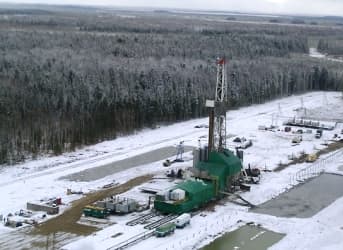The Obama administration earlier this year made a great show about its intention to “pivot” U.S. economic and military interests towards Asia.
Now the Russian Federation appears to be doing something similar.
In delivering his annual State of the Nation address in St. George Hall of the Grand Kremlin Palace on 12 December, Russian President Vladimir Putin spoke to an audience of members of the Federation Council, State Duma deputies, government officials, leaders of the Constitutional Court, Supreme Court and the Court of Arbitration, regional governors, chairmen of Federation legislative assembly and religious denominational leaders, along with the heads of major media outlets. The address was being delivered on the 20th anniversary of the Russian Constitution, which was adopted by popular vote on 12 December 1993.
Related article: Putin Agrees Deal with Yanukovych to Provide Loans and Cheap Natural Gas
Near the end of the hour-long speech, Putin declared improving Siberia and Russia’s Far Eastern provinces’ economies a “national priority.” Putin directed his officials by 1 July 2014 to determine what regions of Eastern Siberia and the Far East will be targeted for advanced development in a state-private business partnership. Putin proposed, among other things, creating a network of special territories that can offer attractive conditions to non-resource industries, primarily export oriented ones, telling his audience that “the resources of the state and private business have to go to private development to achieve the nation’s strategic goals. For example, building up Siberia and the Far East. This is our national priority for the entire 21st century. The tasks that are to be resolved are unprecedented in scale, and this means our steps have to be innovative.”
Putin recalled earlier government decisions to reduce income tax and other tax rates to stimulate a number of new investment projects in the Far East and offered "to extend this regime to all of eastern Siberia, including Krasnoyarsk Krai and the Republic of Khakassia. New enterprises located in such areas must be provided a five-year holiday on income tax, severance tax, except for oil and gas – which are already profitable industries, taxes on land, property, and something that is very important for the process industries, preferential insurance rate premiums. This will create a competitive business environment…”
Putin also noted that bureaucratic red tape helped stymie Russia’s export potential, remarking, “The next task is support for the non-raw materials export sectors. This support system has still not begun working in full. Many administrative barriers remain in place. It takes more than 20 days to get an export permit. In comparison, it takes 6 days in the United States, and in Canada or South Korea it takes 8 days. These are all issues that need to be addressed in a new roadmap for supporting exports. I ask the Government, together with the Strategic Initiatives Agency, to draft this roadmap by 1 March 2014.” In a deft sleight of hand passing the ruble, Putin ordered Prime Minister Dmitry Medvedev to take the initiative under his “personal control.”
Japan's Association for Trade with Russia and the New Independent States director Toshikazu Endo was quick to praise Putin’s vision, stating that Japan's business community pinned much hope on the initiative in Putin’s speech, welcoming the concept of reviving investment activity in a region focused until now on mineral extraction, particularly Putin’s call for ? five-year moratorium on corporate tax, real estate and property taxes alongside preferential insurance rates assessed as important for hi-tech production.
Related article: Texas 2014 Oil Output to Surpass Some OPEC Members
The economic potential of Siberia has been touted in Moscow ever since the late 16th century military campaigns of Tsar Ivan the Terrible opened up the region. The Far Eastern provinces came much later under Russian domination, stripped from China in the mid-19th century by treaties that Mao Tse Tung called “unequal,” a fact that might still resonate in Beijing, given its growing squabble with its Asian neighbors over Western Pacific archipelagos. Interestingly, Beijing has remained silent up to now on the business opportunities offered in Putin’s speech.
Furthermore, Putin’s vision will have a number of arduous obstacles to overcome, not the least of which is a poorly developed transportation infrastructure and a relatively miniscule population.
Siberia is fabulously wealthy in natural resources; besides extensive unexploited oil, natural gas and coal energy resources, it contains some of the world's largest deposits of nickel, gold, lead, molybdenum, diamonds, silver and zinc. Oh, and Putin has made upgrading the Trans-Siberian railroad another top priority. But at present, one of Siberia’s and the Far Eastern Provinces’ values is as an energy corridor, with 3,018 mile-long, 1.6 million barrel per day Eastern Siberia–Pacific Ocean (ESPO ) oil pipeline, which exports Russian crude oil eastwards to Japan, China and Korea. ESPO is paralleled by the 1,264 mile-long Yakutia–Khabarovsk–Vladivostok natural gas pipeline, currently under construction and scheduled for completion in 2016. So, however much Putin might dismiss energy “extractive” industries, they are currently providing a rising revenue stream from Siberia and the Far Eastern provinces to Moscow – 5,000 miles away.
By. John C.K. Daly of Oilprice.com


















